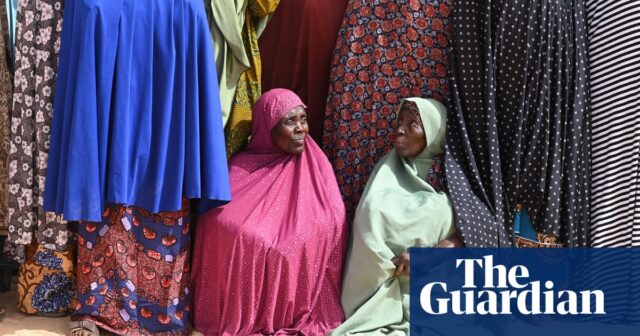On 12 December, Hadjara Zibo and her three young daughters ran to the hills from their home in Libiri as armed jihadists stormed their village in Niger’s Tillabéri region, near the border with Burkina Faso and Mali.
“If they reached us, they could rape and kill us,” says Zibo, 39, describing how they escaped amid gunfire and flames.
The assault on the village left 21 people dead, houses burned and valued possessions plundered. Less than 48 hours later, another 18 people were killed, this time in Kokorou, another settlement in Tillabéri.
The Nigerien junta has been struggling to contain the rising tide of jihadist attacks in the tri-border area, 18 months after it seized power.
In 2021, the same Islamic militants killed Zibo’s husband on their farm, leaving her alone with the financial struggle of raising three children alone.
“They kill men in front of the women,” she says, adding that many women were then forced to become jihadists’ wives or sex slaves. Her sister was abducted by suspected jihadists last June.
“I think the end is near,” she says. “Women face horror and humiliation, and with no help from the junta, we are left at the mercy of the jihadists.”
Before Niger’s military seized power in July 2023, pro-Russian narratives in the country had blamed the insecurity on western alliances under the ousted president, Mohamed Bazoum, despite Niger outperforming its Moscow-aligned neighbours, Mali and Burkina Faso, in combating jihadists.
The new military government, led by Gen Abdourahamane Tchiani, has leaned into anti-western sentiment, claiming they could better address extremist threats.
However, jihadist violence has escalated in the 18 months since the coup, with about 1,599 deaths reported – more than double the 770 recorded under democratic rule, according to the civilian violence monitor Acled.
Islamic State – Sahel Province, an affiliate of the group formerly known as Isis, has claimed responsibility for recent attacks on civilians and military outposts in Tillabéri, a region where groups linked to both IS and al-Qaida are active.
Women and girls are especially vulnerable, facing rape and enslavement amid escalating violence and dwindling international aid and attention.
The junta’s inability to counter jihadist operations, coupled with its expulsion of western media, has obscured the plight of women, according to a senior Nigerien analyst in the capital, Niamey. The media bans and expulsions of journalists have allowed propaganda to flourish, claiming military success against the insurgents and covering up attacks.
“With the continued censorship and expulsion of media, the conflict in Niger will soon become a forgotten war, and more women and children will suffer for the junta’s incompetency,” the analyst said.
More than a dozen displaced women in Tillabéri told the Guardian how the extremists exploit the existing patriarchal system. The deliberate killing of male relatives and those who resist is a tactic to tighten control over women, leaving them vulnerable to further subjugation under jihadist rule, they say.
“Last September, when our settlement was raided, an assailant asked why my 15-year-old daughter was not married,” says Mariama, 41, a widow in Tillabéri. “Then the other assailant took off her clothes and raped her.”
At least 90 soldiers were reported to have been killed in a recent jihadist assault on Chatoumane town, according to eyewitness reports and intelligence. The Nigerien junta and Russian-backed media claimed only 10 men were lost.
Experts argue that Russia’s focus in Niger and the Sahel is on supporting military juntas to protect client regimes, and there is no interest in combating extremism or supporting civilians.
Joseph Siegel, research director at the US Department of Defense’s Africa Center for Strategic Studies, calls this dynamic “the great paradox” of the partnerships between Sahelian juntas and Russia.
Nevertheless, Niger has pledged to bolster cooperation with the military juntas in Burkina Faso and Mali by forming a new security pact, the Alliance of Sahel States. The three nations also plan to formally withdraw from the west African regional economic and political union, Ecowas.
Nathaniel Powell, a researcher at Oxford Analytica, a global risk consultancy, says: “While Bazoum’s strategy weakened jihadist recruitment in Tillabéri by offering demobilisation pathways, it did not involve negotiations with jihadist leaders, who had little interest in such talks.
“But the Niger junta focuses on military solutions to jihadist threats, rejecting diplomatic efforts,” says Powell, who believes the junta’s strategy has increased civilian casualties.
In 2023, nearly 42% of Niger’s 26 million people were living in poverty, with 4.4 million in immediate need of humanitarian aid. The country ranked the fourth lowest of 193 countries in the UN’s latest Human Development Index. Foreign assistance makes up nearly 40% of its budget, but the coup led to international aid being cut off.
The economic strain from sanctions and aid cuts has heavily affected displaced women in Niger, who face food insecurity as well as fear of attacks and sexual violence.
Healthcare shortages, particularly in maternal and reproductive services, have worsened, being restricted by the junta and inaccessible in jihadist-controlled areas.
Fatimatu Zahra, 21, from Tillaberi, who lost her relatives in a jihadist attack last year, struggles with the high cost and scarcity of menstrual supplies. Unable to afford pads, she uses old fabrics or leaves instead.
“I don’t feel ashamed,” Zahra says. “Many women in similar situations do the same.”
The Nigerien military government did not respond to requests for comment.






